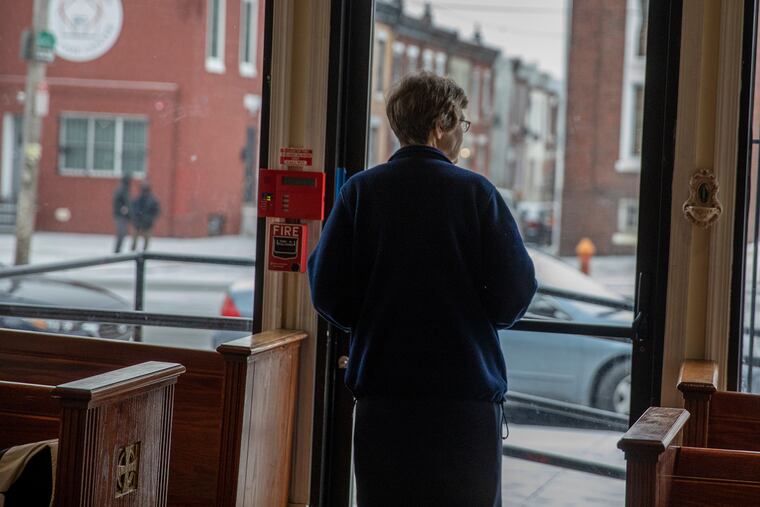On one of Kensington’s worst drug corners, three religious groups try to keep the faith | Mike Newall
The police are playing Whac-a-Mole with the dealers right now. And Weymouth Street is the mole.

When the police raided the block last Wednesday afternoon, the nuns at the Sisters of Saint Joseph Welcome Center knew what to do: They locked their doors.
They told the volunteer instructors who teach the English classes at this Kensington outreach center that they couldn’t go home just yet.
The Welcome Center sits on Allegheny Avenue, between Weymouth and Custer Streets, at one of the busiest drug spots in Kensington. People have been flocking to sell, buy, and use drugs here, as the city has cleared heroin encampments and drug users have scattered through the neighborhood.
The situation with the dealers is like playing Whac-a-Mole, said Stephen Clark, captain of the 24th District.
And right now, he said, Weymouth is the mole.
But this crowded intersection is also one of the neighborhood’s most faithful – literally. There are the sisters at the Welcome Center. Then the Catholic priests and nuns across the street at the Mother of Mercy House mission. And next door to the Welcome Center is a Seventh-Day Adventist church, whose congregants come from the neighborhood and across the city.
As the drug markets that have long flourished there bustle with new arrivals, each of these faith group deals with a storm in what ways it can – and the new realities show how the opioid crisis overwhelms everything in Kensington.
These people of faith chose Kensington to combat illiteracy, hunger, joblessness, hopelessness. The plagues that primed the neighborhood to become the epicenter of the country’s urban opioid crisis. And their missions now bear the added load of a public health emergency.
The sisters at the Welcome Center have made changes that leave them heartbroken – the gates that they had to install outside because people were cooking drugs on their stoop and the sisters worried about a fire. They’ve stopped gardening – too many needles in their flower beds.
But they’re also nuns, and therefore soul-bound to “commit acts of mercy,” as Sister Pat Madden calls it.
They don’t call the police on dealers, unless there’s violence, like the homicide last summer: The dealers are their neighbors and just kids. The nuns talk to the dealers and the young people who sleep on their sidewalk, giving food, directing them to services, telling them there’s still a way out. They’ve saved one overdose victim with Narcan. Earlier this week, Sister Kathy McShane threw another dose to a man running down the street, screaming for help.
“We are in the center of it,” she said. “We can’t help but be touched by it.”
Amid the sirens and the lockdowns, they try to carry on their original mission to help immigrants get a foothold in this country – newcomers whose first taste of America is the view from the window of Sister Pat’s citizenship class: an endless reel of deal after deal, shouting, despair. The students are scared, but they adapt. Like Elizabeth Baez, who got her citizenship studying at the center but is too afraid to walk the few blocks for night classes anymore. She comes in the day instead, wanting to keep up with her lessons.
Next door, at the Seventh-Day Adventist church, the pastor’s done adapting. He did not want his name printed, both because his higher-ups asked him not to, and because he didn’t want to antagonize the dealers perched on his church steps.
This is his homily now: There are dealers on the steps, needles in the parking lot. There was a homicide two years ago, and two fatal overdoses outside the church last year. Congregants from outside the neighborhood have stopped coming.
“We tried to have faith the situation could change,” the pastor told me. But that faith ran out.
And then there is Father William Murphy and Sister Ann Raymond in the storefront church across Allegheny, who measure progress by the number of sleeping forms they step over in the morning. And by whether they need to wipe blood off the church’s front windows – blood spilled from the veins of people injecting outside in the night.
Mother of Mercy House opened in 2015 to cater to the city’s poorest, hungriest, and most drug-plagued neighborhood. Since the opioid crisis hit, they tend to two communities. They connect their congregants to social services and once a week they hand out 90 bags of food to neighborhood families – and upwards of 100 sandwiches and snacks each day to people in addiction.
“They are also battling for resources,” said Sister Ann.
It’s just one intersection in Kensington, and just three small religious groups. But the burden they shoulder is the one the entire neighborhood carries.
And in Friday morning’s snow, business boomed on Weymouth as the sisters taught in the basement of the Welcome Center. At Mother of Mercy, Sister Ann buzzed in homeless people who had been evicted from a heroin encampment, and were now sleeping on the avenue. At the Seventh-Day Adventist Church, a for-sale sign hung in the window. Underneath it, the deals went on.